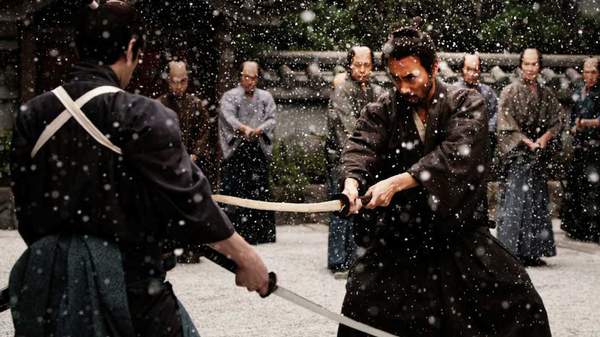Overview
Director Takashi Miike transports us back in time — not only into the cruelly executed hierarchy of the 17th century samurai but also into Japanese cinema's Golden Age. His expressive tale of solitary heroism moves with an arthouse patience and poise, and the violence is deeply affecting, rather than for effect.
In this respect, Hara-Kiri: Death of a Samurai represents a departure from the spectacularly bloody epics for which Miike is known, such as 13 Assassins and Audition. This should come as no surprise, though, for those intimately acquainted with the prolific Japanese director's work, which includes at least 70 productions. His filmmaking has never been confined to creativity-crunching limitations — he's dabbled with comedy, children's films and period drama.
A story-within-a-story structure propels the narrative. Hanshiro (Ebizo Ichikawa), an out-of-work samurai, seeks permission from the House of Li to commit seppuku (honourable self-disembowelment). Suspicious that Hanshiro might be another in a line of poverty-stricken warriors who have been attempting "suicide bluffs" for financial gain, the feudal lord, Kageyu (Koji Yakusho) regales him with the tale of Motome (Eita). A young man who came seeking a few coins to save his dying family, Motome was forced to self-disembowel on a bamboo sword, having already sold his own. What Kageyu does not realise is that Motome and Hanshiro knew each other well. Hanshiro is on a mission to avenge Li's lack of humanity and expose the lie beneath the front of "honour", which enables the condemnation of the lower classes to unemployment, sickness and death.
Miike does not hold back in his critique of sadism. Putting aside broad-brush depictions of bloodletting, he reaches his viewers through specific experiences and emotional investment in character. Motome's horrendously slow suicide is depicted so viscerally, it's not easy to keep your eyes on the screen. As his increasing physical and mental agony is mirrored by the gradual snapping of his pathetic bamboo sword into impossibly blunt pieces, the feudal authorities seem to have no limits on their capacity for brutality.
Cinematographically, Hara-Kiri inhabits a shadowy world. Symmetrically positioned characters and 17th-century architecture frame the drama. Contrast is subtle, rather than extreme, achieved through the natural rhythms of day and night and the passing of the seasons — bursts of spring sunshine, fiery autumn leaves and silent snow showers — intensified by Ryuichi Sakamoto's restrained yet haunting score.
Hara-Kiri: Death of a Samurai is one of Miike's finest, saddest and most important films. It's a brave depiction of a brutal world whose romantic mythology has often curtained a pitiless and unjust reality.
https://youtube.com/watch?v=R-sp6Xw0jJU
Information
When
Thursday, March 21, 2013 - Wednesday, April 17, 2013
Thursday, March 21 - Wednesday, April 17, 2013
Where
Various cinemas in SydneyPrice
$15-20-
Event Type
